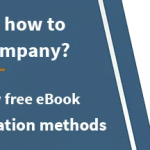After talking about the opportunity to get the seller to finance your acquisition, today we discuss the three main mistakes in the sale of a company.
1. Manage Confidentiality
The first mistake is not managing confidentiality. The sale of a company has to be a confidential process in which the entrepreneur, accompanied by financial advisors, shows the company only to those who really have the interest and ability to buy the company. Therefore, you should not present your company to several intermediaries given it will be difficult to manage the confidentiality of the sale process.
What you must do is choose an advisor; only one that is to be used throughout the whole process. They will take care of confidentiality, so to ensure that the whole market will not know about the company that you are selling.
Additionally, in the event that the company not been sold, it would produce a negative perception about your client. The sales process of companies have to be fast and directed to investors that are really interested.
2. Move the Company to a Local Area
The second major error in the sale of a company is to focus the sales process to a local area. The best buyer is probably not in your country, let alone not in your area.
You have to make a broad approach. You have created a lot of value for many years and what does not make sense is to sell to the wrong person or sell the company quickly to the first buyer that shows interest.
Find the one that fits the best and has the greatest capacity within their reserve to pay for the value of your company.
3. Not Using Experienced Consultants
Do not face the process alone! The buyers will bring very experienced advisers, and you must too. Use experienced advisors: there are many pitfalls in a company’s sales process!
There was a case of a customer who was pressuring the buyer to sign the price on offer that they had already submitted, but the offer they had made was on the value of the company and not on the value of the shares. The value of the company had to be subtracted from the debt and, once the debt was subtracted, the value of the shares was very low.
If he had agreed to sign the transaction without understanding the difference between the value of the company and the value of the shares, he would have committed and placed himself in exclusivity with an inadequate buyer who had also given him a penalty clause in case he left the negotiations. As such, he would have been caught in a very complicated sale if it went ahead.
The advisors know how to help you get out of unwanted situations. Count on them, trust them and do not let the buyer fool you! On many occasions the buyer wants your advisors to not be there. He tells you that it is better not to talk to them because they make the process difficult. Ignore this suggestion, they are there to help you!
The advisors will create impediments during wrong processes, in order to help you achieve a proper process, and to ultimately protect your interests during the negotiation of the sale of the company. They know how to manage it because they are experienced and have been part of many operations.
Therefore, it is essential to use advisors who have real experience, who are not intermediaries, who are professionals in finance and corporate operations. Selling a company is a very complex aspect in which there are many elements to monitor and deal with. Do not ever put yourself in the hands of intermediaries, put yourself in the hands of advisers!
If you consider the sale of your company, and neglect the 3 main mistakes in the sales process, you will have to go through different stages to help you maximize the final price. Do you know which ones they are? Download the eBook “HOW TO MAXIMIZE THE PRICE OF YOUR COMPANY” where, in a simple way, we explain how to prepare the company for sale.
















